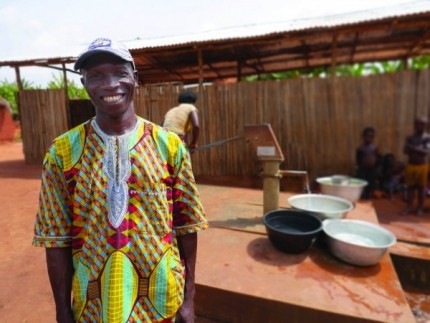
Before receiving a deep-capped well, the villagers of Windjinnawa, Benin knew that the only water available to them was unsafe and could cause them to contract deadly diseases. Still, they drank the dirty water because they had no other option.
“We used to get our water from the swamp,” Village Chief Jacques told the Water for Life Initiative team during a visit in August. “We know that it is not potable, that it is dirty water, but we had no choice. When we drank it, both kids and adults would get sick. Kids have died because of cholera (a waterborne disease).”
Once GAiN provided a well for Windjinnawa, the difference in health was immediate and significant. There was no more sickness caused by contaminated water. Villagers were able to save money because they no longer had to pay for hospital visits or medicine for treatment of illnesses.
“People were amazed,” Jacques recalled the first sight of clean water from the well. “They could not believe it. They were asking, “Is this clean water that is coming out of here?” This is some kind of dream for us. We never thought we would have clean water in our village.”
Since the addition of the well in the village, Windjinnawa set up a system to collect 10 CFA francs ($0.02 CAD) per bucket, putting the money aside for well maintenance and possible future repairs.
“For people [10 CFA francs per bucket] is affordable. The well has brought them so much relief from going to the swamp, which is even farther. They’re happier to pay 10 francs per bucket than going to the swamp.”
Jacques aspires that the village will be able to save enough money from the funds collected to build a water tower, to get water pumped directly to family homes.
Until then, GAiN’s water program continues to make an impact in Windjinnawa households through different community education and health opportunities.
Jacques explained how he and other villagers are implementing what they learned in hygiene and sanitation trainings. He gave the example of putting a lid on the bucket after filling it up with water, and having soap next to it, ready for use.
“We use the handwashing stations and even small children are taught to wash their hands before they do anything.”
Gender sensitivity trainings also made a great impression on him. “When there is mutual understanding between the man and the woman in the house and when you actually apply the teachings in your household, it sure brings peace.”

Leave a Reply